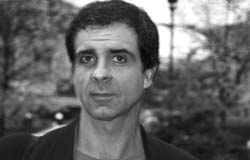(THIS ARTICLE IS MACHINE TRANSLATED by Google from Norwegian)
The anthology consists of a number of articles about today's neoliberal world and what it takes to tame market forces and multinational companies. Editors are Yves Boutroue and Vegard Velle, both key players in the Attac network Gamle Oslo. Ny Tid has spoken with one of the editors, Yves Boutroue.
Skilled activists
Boutroue says that he and Velle were keen to make knowledge of globalization and opposition to it accessible to more. According to Boutroue, Norwegians know far too little about this topic. He compares what he perceives as a lack of debate about globalization in Norway with how the nuclear case was received in France at that time. There was very little debate in the beginning. It is important to raise the level of knowledge. And an anthology on these current and burning issues can, according to Boutroue, remedy some of the shortcoming. Among the writers in the anthology we find Susan George, José Bové, Pierre Bordieu, Naom Chomsky, Ignacio Ramonet, John Rees, Walden Bello, Subcomandante Marcos, Rune Skarstein and Tore Linné Eriksen.
- We need elements of knowledge about globalization, says Boutroue.
- In the Norwegian market, there is a shortage of this. In contrast to, for example, Sweden where there are several books and magazines on the subject. My main impression is that there are many magazines in Norway, but few about globalization. We lack documentation that can provide a basis for discussion.
Another reason why they started this book project is the start-up of the Attac network Old Oslo. Both Yves Boutroue and Vegard Velle were key figures in the start-up of this local team of Attac. With this book, they would give the other members training as a starting point for discussion about Attac and the issues the organization was created to deal with.
- What criteria did you follow when selecting contributors to the book?
- We went by well-known and respected names, and one of them is Susan George. We visited her in Paris to get ideas for the book. We also tried to arrange a meeting with José Bové, but failed. In addition, we thought it was important to include some Norwegian contributors.
Boutroue further says that they wanted to include both "fix it" and "nix it people" among the writers. For those who may not be familiar with these terms, "fix it" stands for those who want to reform capitalist institutions such as the WTO and the World Bank, while "nix it people" want to abolish them. He emphasizes that both Velle and himself belong to the "nix it wing".
challenges
When asked what he now sees as the most important challenges for the anti-capitalist movement, Boutroue refers to the slogan "think globally and act locally". He explains that some within the movement will demonstrate at the major summits, while others follow the advice of Susan George to also demonstrate locally.
- There is no contradiction between these methods. That is why it is important to demonstrate in Oslo, including on November 9 when the WTO arranges its summit in Qatar.
He is also concerned that the movement must not lose momentum. It is important that the debate within Attac continues. Boutroue is nevertheless concerned that the diversity of Attac will be lost, and believes it may be difficult to maintain "unanimity".
- Attac must not be swayed by special interests.
Yves Boutroue also emphasizes that being against globalization does not mean being against the United States. Therefore, one should not be fooled by those now trying to put the terrorist stamp on those who do not fully support the US bombing of Afghanistan.
- What about the working class, does it not have an important role to play in the future?
- It does not hurt if it participates in the fight, but I have long had a lack of faith that the masses can get involved. But the formation of Attac has corrected something. Those who sent the multilateral investment agreement (MAI) into the sink were especially the French newspaper Le Monde Diplomatique and intellectuals, Boutroue believes.
- The movement is unstoppable
The foreword to "Another World is Possible" concludes with the following quote by José Bové: "This movement is unstoppable now – both in the south and in the north. What we have seen so far is nothing ”. Boutroue agrees with this and points to Subcomandante Marcos' use of the internet to communicate with the outside world. It is also not for nothing, according to Boutroue, that Torbjørn Jagland sees himself forced to support Attac.
- Reiulf Steen said that the politicians have played their role. Turnout is declining. Attac accepts many of these and pursues real politics. Attac's recovery is a sign of a democratic deficit in society. The fact that blank votes never appear is undemocratic. Those who vote blank, do their civic duty. Attac draws strength from some of them. In France, blank votes are counted, they are not abstentions, Yves Boutroue points out.
Genetically modified products
Boutroue is particularly concerned about genetically modified products and believes it is almost a non-topic in Norway today. He mentions that Greenpeace in France has a list of genetically modified products, while in Norway it is almost impossible to know if the food you buy in the store is genetically modified or not. According to Boutroue, about 90 to 95 percent of the maize produced in the United States is genetically modified.
- When most of Norway's imports of maize come from the USA, Norwegians eat a lot of genetically modified maize, Boutroue believes.
When it comes to soy, he explains that it's much more difficult to find out if it's genetically modified.
- Soy is found in chocolate, among other things, and we give this to our children, he explains indignantly.


